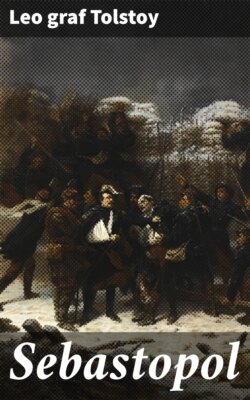Читать книгу Sebastopol - Leo Graf Tolstoy - Страница 3
На сайте Литреса книга снята с продажи.
I.
ОглавлениеTable of Contents
A regimental band was playing in the besieged city of Sebastopol; a crowd of soldiers and women in Sunday best was promenading in the avenues. The clear sun of spring had risen upon the English works, had passed over the fortifications, over the city, and over the Nicholas barracks, shedding everywhere its just and joyous light; now it was setting into the blue distance of the sea, which gently rippled, sparkling with silvery reflections.
An infantry officer of tall stature and with a slight stoop, busy putting on gloves of doubtful whiteness, though still presentable, came out of one of the small sailor-houses built on the left side of Marine Street. He directed his steps towards the boulevard, fixing his eyes in a distracted manner on the toe of his boots. The expression of his ill-favored face did not denote a high intellectual capacity, but traits of good-fellowship, good sense, honesty, and love of order were to be plainly recognized there. He was not well-built, and seemed to feel some confusion at the awkwardness of his own motions. He had a well-worn cap on his head, and on his shoulders a light cloak of a curious purplish color, under which could be seen his watch-chain, his trousers with straps, and his clean and well-polished boots. If his features had not clearly indicated his pure Russian origin he would have been taken for a German, for an aide-de-camp, or for a regimental baggage-master—he wore no spurs, to be sure—or for one of those cavalry officers who have been exchanged in order to take active service. In fact, he was one of the latter, and while going up to the boulevard he was thinking of a letter he had just received from an ex-comrade, now a landholder in the Government of F——; he was thinking of his comrade’s wife, pale, blue-eyed Natacha, his best friend; he was especially recalling the following passage:
“When they bring us the Invalide,[A] Poupka (that was the name the retired uhlan gave his wife) rushes into the antechamber, seizes the paper, and throws herself upon the sofa in the arbor[B] in the parlor, where we have passed so many pleasant winter evenings in your company while your regiment was in garrison in our city. You can’t imagine the enthusiasm with which she reads the story of your heroic exploits! ‘Mikhailoff,’ she often says in speaking of you, ‘is a pearl of a man, and I shall throw myself on his neck when I see him again! He is fighting in the bastions, he is! He will get the cross of St. George, and the newspapers will be full of him.’ Indeed, I am beginning to be jealous of you. It takes the papers a very long time to get to us, and although a thousand bits of news fly from mouth to mouth, we can’t believe all of them. For example: your good friends the musical girls related yesterday how Napoleon, taken prisoner by our cossacks, had been brought to Petersburg—you understand that I couldn’t believe that! Then one of the officials of the war office, a fine fellow, and a great addition to society now our little town is deserted, assured us that our troops had occupied Eupatoria, thus preventing the French from communicating with Balaklava; that we lost two hundred men in this business, and they about fifteen thousand. My wife was so much delighted at this that she celebrated it all night long, and she has a feeling that you took part in the action and distinguished yourself.”
In spite of these words, in spite of the expressions which I have put in italics and the general tone of the letter, Captain Mikhaïloff took a sweet and sad satisfaction in imagining himself with his pale, provincial lady friend. He recalled their evening conversations on sentiment in the parlor arbor, and how his brave comrade, the ex-uhlan, became vexed and disputed over games of cards with kopek stakes when they succeeded in starting a game in his study, and how his wife joked him about it. He recalled the friendship these good people had shown for him; and perhaps there was something more than friendship on the side of the pale friend! All these pictures in their familiar frames arose in his imagination with marvellous softness. He saw them in a rosy atmosphere, and, smiling at them, he handled affectionately the letter in the bottom of his pocket.
These memories brought the captain involuntarily back to his hopes, to his dreams. “Imagine,” he thought, as he went along the narrow alley, “Natacha’s joy and astonishment when she reads in the Invalide that I have been the first to get possession of a cannon, and have received the Saint George! I shall be promoted to be captain-major: I was proposed for it a long time ago. It will then be very easy for me to get to be chief of an army battalion in the course of a year, for many among us have been killed, and many others will be during this campaign. Then, in the next battle, when I have made myself well known, they will intrust a regiment to me, and I shall become lieutenant-colonel, commander of the Order of Saint Anne—then colonel—” He was already imagining himself general, honoring with his presence Natacha, his comrade’s widow—for his friend would, according to the dream, have to die about this time—when the sound of the band came distinctly to his ears. A crowd of promenaders attracted his gaze, and he came to himself on the boulevard as before, second-captain of infantry.
